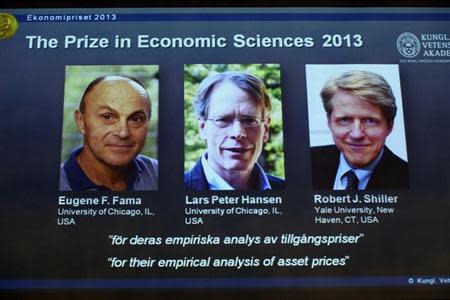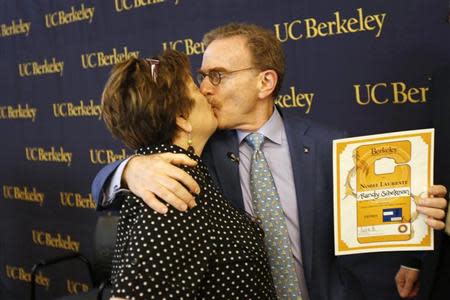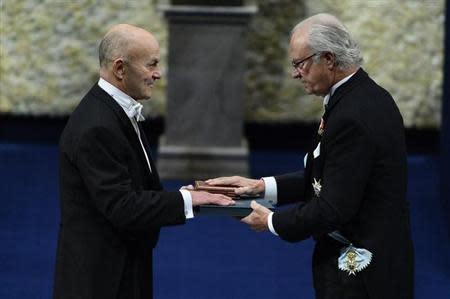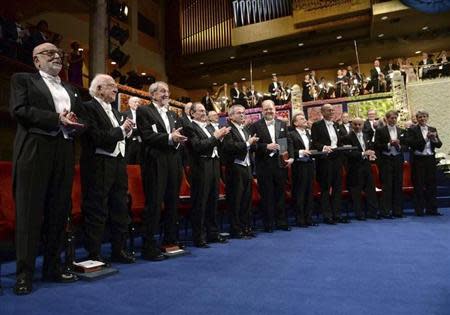Noble beginnings: The first jobs of Nobel Prize winners
By Chris Taylor NEW YORK (Reuters) - We all start somewhere. Reuters has proven this edict since last August, when we started asking some of America's greatest achievers about the first jobs they had. We have talked to chief executives of billion-dollar companies, beloved authors, TV personalities and tech gurus. But then we figured: Let's talk to an even more elite club. And you can't get much more exclusive than those who have reached the absolute pinnacle of human achievement: the Nobel Prize. Here, in conjunction with the release of the nation's monthly jobs report, some American Nobel winners recount their very first humble gigs and the unlikely lessons that set them on the path to extraordinary achievement. Name: Eugene Fama Affiliation: University of Chicago Nobel in Economic Sciences for: "empirical analysis of asset prices" First job: Car washer "I was 14 and living in Boston, and grew up in a poor neighborhood. The guy across the street owned a car wash, so I started working there on Saturdays during the school year. Those were very long days, as I remember. "The new car washes don't even have people in them, but at that time we cleaned them all by hand. In those days it was always American cars like Fords and Chevys, no Hondas or Toyotas. This would have been about 1953, going way back in time, and I have no idea what they paid me, but I think it was way less than $1 an hour. "Later I worked as a stock boy for a ladies' department store in Boston, E.T. Slattery's, and then later rolling steel in a steel mill. I made a lot of money, but it was so dangerous. What I learned from all those jobs is that I had better get an education. That was the takeaway." Name: Carol Greider Affiliation: Johns Hopkins Nobel in Medicine for: "the discovery of how chromosomes are protected by telomeres and the enzyme telomerase" First job: Horseback riding instructor "As a high-school student growing up in Davis, California, I remember applying for about 30 or 40 jobs, everything from scooping ice cream to washing dishes. I was turned down for every single one. I remember beating the pavement with my resume, and never landing anything. "Finally, I ended up at the Happy Horse Riding School, stables which were about 30 minutes outside of town. I had taken lessons there since I was six, and they thought I might make a good teacher. I taught a class called 'vaulting,' which is basically gymnastics on horseback. "This was back in 1976, and I guess I made around $6 an hour. I did learn a lot about leadership, since I was only around 17 at the time, but I had to be the one in charge. If you look at my grad photos I actually have a splint on my broken finger, after I had to get control of a horse that got out of hand. "I still enjoy doing things with horses. My life has been taken over by science every since, but I still have a soft spot in my heart for them." Name: David Wineland Affiliation: National Institute of Standards and Technology (NIST) Nobel in Physics for: "ground-breaking experimental methods that enable measuring and manipulation of individual quantum systems" First jobs: Delivery boy and dishwasher "Delivering the Sacramento Bee newspaper in the early 1950s was one of the best jobs I ever had. I took on two routes, had a couple hundred papers to deliver, and did it all on my little bicycle. I was around 10 when I started, and ended up making around $1,500, which was very good money at the time. The only thing I didn't like was collecting the bill, because people would take off without paying and I would have to lump the cost myself. "I also had the worst job of my life around then, which was as a dishwasher at a food court in a shopping center. The sheer drudgery of it, all for $1.25 an hour. The only good thing that came out of it, is that it convinced me to go to college so I could get a better job. I learned the hard way that I didn't want to work my whole life for minimum wage. "I started working so young because my parents were products of the Depression. It was ingrained in me very early on that I was going to have a job. I've carried that with me the rest of my life. That is one lesson that seems to be absent these days." Name: Randy Schekman Affiliation: University of California, Berkeley Nobel in Medicine for: "discoveries of machinery regulating vesicle traffic, a major transport system in our cells" First job: Glassware washer "I was looking for a job while in high school, and I was put in touch with a glassware-washing facility in the pathology lab of a hospital in Long Beach, California. I was supposed to be cleaning up, but I took the opportunity to tinker around with all the microbiology instruments they had. The supervisor thought that I was very distracted, and that I was more interested in the instruments than in washing up, which was true. "I made maybe around $1,000 over two or three months. But this was in the summer of 1966, at a time when public higher education was not that expensive. Back then the fees at UCLA were only around $40 a term, and room and board only $400 a term, so my little job was enough to pay for much of the school year. "It was labor-intensive, smelly, and not terribly inspiring. I know my bosses didn't think they had future Nobel material on their hands. I don't know what they thought. I was adequate at best." (The writer is a Reuters contributor. The opinions expressed are his own.) (Follow us @ReutersMoney or at http://www.reuters.com/finance/personal-finance; Editing by Lauren Young and Paul Simao)





